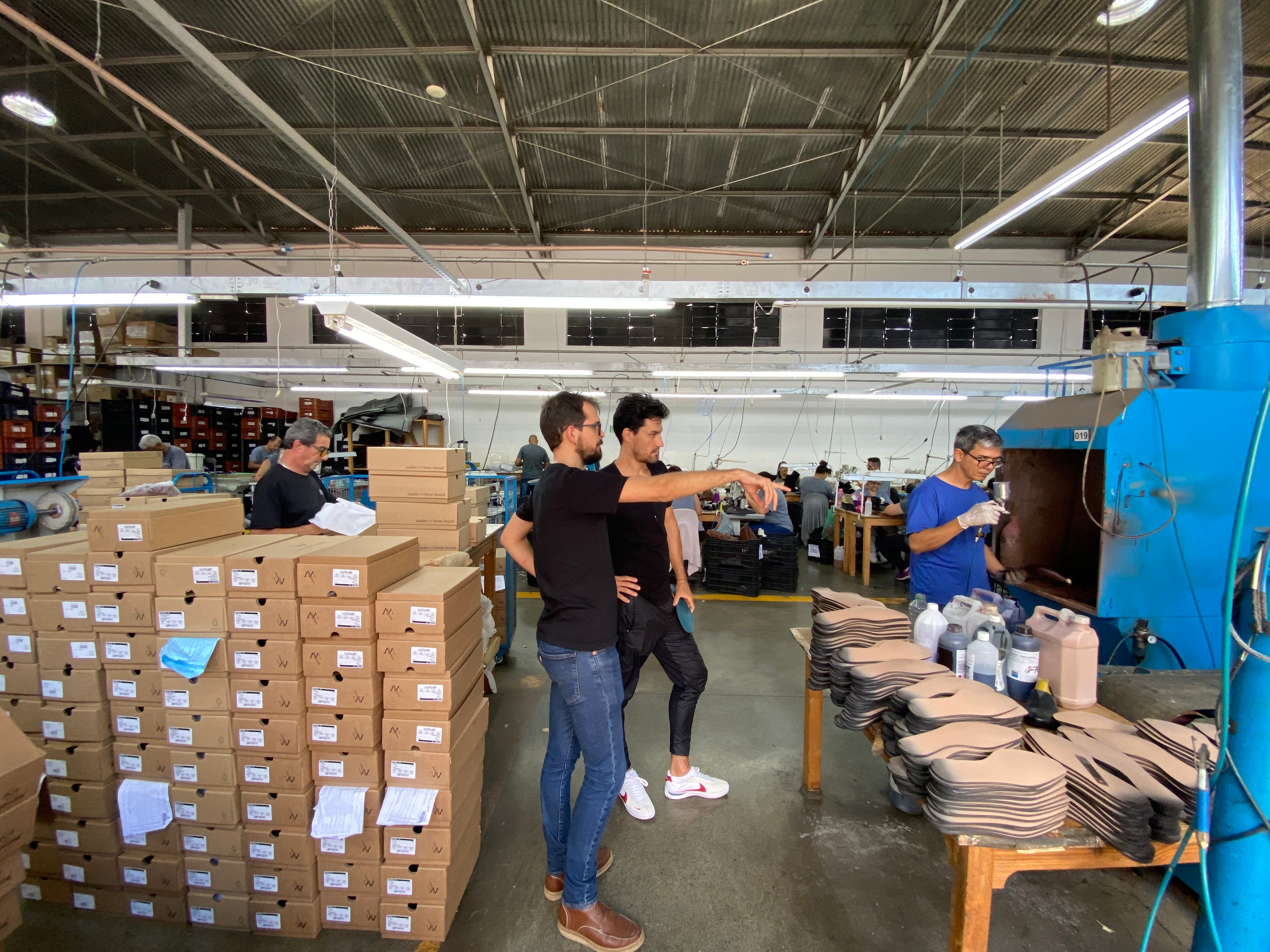Chapter 6: Your Ethical Fashion Toolkit
Sustainable fashion isn't just about trends or fleeting fads; it's about a conscious, compassionate approach to clothing that embraces both style and responsibility. It's about understanding the impact our clothing choices have on the planet and the people who make it, and then using that knowledge to dress with kindness.
6.1 Shopping Sustainably: A Guide to Making Kind Choices for Your Wardrobe and the World
As you have read and probably already know in your heart, the fashion industry has a very dark side. It's one of the world's biggest polluters, with its water consumption, carbon emissions, and textile waste leaving a significant mark on our planet. Additionally, unfair labor practices and unsafe working conditions often plague the supply chain. By embracing sustainable fashion, we can become agents of change, advocating for a more ethical and environmentally friendly industry.
The 6 R's of Sustainable Shopping:
Reduce: The most sustainable garment is the one you already own. Before rushing to buy something new, rediscover the treasures in your wardrobe. Give forgotten pieces a second chance by restyling, mending, or swapping them with friends. Remember, minimalism is super chic.
Reuse: Second-hand and vintage clothing stores are treasure troves waiting to be explored. Give pre-loved items a new lease on life and embrace the unique stories woven into their fabric. Not only will you find one-of-a-kind gems, but you'll also be reducing your environmental footprint. A fun way to do this is to host shopping-swap-parties with your friends. Encourage each invited friend to bring 10 pieces from their wardrobe they haven’t worn in the last year and let the swapping begin.
Recycle: When you do need to buy something new, opt for brands committed to sustainability. Look for certifications like GOTS (Global Organic Textile Standard) or Fair Trade, and prioritize natural, durable materials like organic cotton, hemp, or recycled polyester.
Research: Your materials, if buying cotton, opt for organic cotton, when buying polyester look for recycled polyester or alternatives. Many brands are utilizing recycled polyester, made from post-consumer plastic bottles or other recycled sources, helping to reduce the demand for virgin polyester and minimizing the environmental impact associated with raw material extraction.
Replace: Purchases of vegan items made with plastics (PU, PVC) to products made with more plant-based next generation materials.
Rewear: Can we please change the narrative on fashion needing to be a new look everyday or every time you are out? We are now seeing celebrities use their platform to advocate for re-wearing pieces, shouting that it’s OK to be seen in the same dress more than one time. In fact, can we get a hallelujah for the fact that as a trend-setter it is now being celebrated! It is a statement to showcase your values and the respect you have for the planet by wearing the same piece of clothing over and over again. Keep this in mind when purchasing any new clothing and make an intention to invest in pieces that are versatile and can ben worn in many different ways.
Beyond The R’s..
Shop Local: Supporting local designers and artisans not only injects personality into your wardrobe but also reduces the carbon footprint associated with long-distance transportation. Plus, you'll be directly contributing to your community's economy.
Invest in Quality: Opt for timeless, well-made pieces that will last for years to come. This may seem like a bigger initial investment, but it's far more sustainable and cost-effective in the long run. Remember, quality over quantity.
Embrace Ethical Labour: Choose brands that prioritize fair wages, safe working conditions, and respect for human rights throughout their supply chain. Be a voice for those who make your clothes and ensure their well-being is valued. When we shop with kindness, we choose brands that treat their workers and the environment with respect.
Remember, every conscious choice, every preloved garment, every locally-made piece, every gown or dress worn twice is a small step towards a kinder, more sustainable future for fashion. So let's dress with intention, let's wear our values on our sleeves (literally!), and let's show the world that style and compassion can go hand in hand.
6.2 Slowing Down Fast Fashion
Fast fashion has been a dominant force in the fashion industry for the past few decades, characterized by rapid production cycles, low-cost manufacturing, and quickly changing trends. This model encourages consumers to purchase inexpensive clothing items frequently, leading to a wear and discard culture. While fast fashion offers affordability and the ability to keep up with the latest trends, it comes with significant environmental and ethical challenges.The fast fashion industry is associated with all of the following.
Overconsumption: Fast fashion encourages consumers to buy more and buy often, contributing to excessive consumption and a throwaway mentality.
Environmental Impact: The quick turnover of fashion trends leads to increased production, which often relies on resource-intensive processes and materials, contributing to pollution, waste, and depletion of natural resources.
Ethical Concerns: The pressure to produce garments quickly and inexpensively can lead to poor working conditions, low wages, and exploitation of labour in the global garment industry.
In response to the negative consequences of fast fashion, there has been a growing movement towards slow fashion. Slow fashion is an approach that prioritizes sustainability, ethical practices, and a more mindful and conscious consumption of clothing. It encourages consumers to make thoughtful and intentional choices, focusing on quality, durability, and timeless design rather than fleeting trends. Key principles of slow fashion include the below.
Quality Over Quantity: Slow fashion emphasizes well-made, durable garments that stand the test of time. This contrasts with the fast fashion model that often prioritizes cheap and disposable items.
Ethical Production: Slow fashion promotes fair labour practices, transparency in the supply chain, and the use of eco-friendly materials. Brands adopting slow fashion principles prioritize the well-being of both workers and the environment.
Timeless Design: Slow fashion embraces classic, timeless designs that are not tied to seasonal trends. This encourages consumers to invest in pieces that remain stylish over the long term.
Local and Sustainable Sourcing: Slow fashion brands often prioritize local production and sourcing of materials. This helps reduce the carbon footprint associated with transportation and supports local economies.
As the slow fashion movement gains momentum, more brands are adopting sustainable and ethical practices, signaling a positive shift towards a more mindful and responsible fashion industry. Consumers are increasingly recognizing the value of supporting brands that prioritize both style and sustainability.
6.3 Resources for Eco-Friendly Living
As our collective awareness deepens about the environmental impact of our daily decisions, a profound shift is underway, one that transcends mere lifestyle choices and extends into a realm of ethical consciousness, increasing the number of individuals embracing a vegan, sustainable, and eco-friendly approach to life.
Veganism, once perceived as a niche dietary preference, has evolved into a global movement, extending beyond the confines of the plate and influencing various aspects of our lives. The vegan lifestyle, anchored in compassion for all living beings, extends its influence across various domains; from dietary preferences to home decor, beauty, and, of course, fashion choices.
A vegan existence goes beyond the avoidance of animal products; it involves a commitment to cruelty-free alternatives that align with a compassionate ethos. Simultaneously, the call for sustainability has become a rallying cry against the environmental challenges that loom on our horizon. Together, these two pillars form the foundation of a conscientious lifestyle, one that acknowledges the interconnectedness of our choices and their impact on the world we inhabit.
Eco-friendly living is more than a buzzword; it's a philosophy that seeks to minimize our ecological footprint. From the products we consume to the energy we use, eco-friendly living encompasses a holistic approach to daily life. It involves making choices that prioritize the health of the planet, considering the long-term consequences of our actions, and embracing practices that contribute to a sustainable, thriving environment for generations to come.
Veganism and sustainability are not mutually exclusive; rather, they share a symbiotic relationship that can lead to a more harmonious coexistence with the planet. By adopting plant-based diets and sustainable practices, individuals can contribute to a reduced environmental impact, alleviate the strain on natural resources, and promote a world where all living beings can thrive.
Embarking on a journey towards sustainable living requires a roadmap, and, fortunately, a wealth of resources is available to illuminate the path. In the era of information, resources are powerful catalysts for change. From online platforms to community initiatives, these resources empower individuals to make conscious choices. Here is a list of some of my favourite resources to help serve as a guide on your journey.
Better Cotton Initiative: Promotes sustainable cotton production and farming practices.
Common Objective: A platform connecting professionals in the sustainable fashion industry.
Consumption Project: a space that encourages conscious consumption; it’s a platform that addresses the detrimental effects of consumerism on the environment while championing the art of the industry.
Ethical Fashion Forum: Empowers fashion professionals to create a more sustainable industry.
Fashion Revolution: Advocates for a more transparent and ethical fashion industry.
Fair Trade Certified: Ensures fair wages and ethical treatment for workers in various industries, including fashion.
Global Organic Textile Standard: Certifies organic textiles, covering social and environmental aspects.
Material Innovation Initiative: a think tank focused on research, knowledge-sharing, and fostering connections to fast-track the development of environmentally preferable and animal-free materials.
Sustainable Apparel Coalition: Develops the Higg Index to measure and score a product's sustainability.
Sustainable Fashion Alliance: Connects and supports sustainable fashion professionals.
Slow Fashion World: A global community supporting slow, ethical, and sustainable fashion.
Textile Exchange: Promotes sustainability in the textile industry with standards and certifications.
Vegan Women Summit: Their mission is to inspire, educate, and empower future and rising women leaders on how to bring compassion to their career and industry through events and community building.
For your phone, here are some Apps:
aBillion: a 100% vegan social media platform and marketplace
Cowculator: keep track of how much water, grain, forested land, CO2, and animal lives you save
VeganPocket: scan any barcode to check to see if it is vegan
And on Instagram, some of my favourite accounts to follow:
@FashionTakesAction @FutureVvorld @livekindly @PETA @plantbasednews @consciousfashioncollective @secondhand.sustainability @theveganfashionshow @vegnews @veganfashionweekFor listening, check out one of my favourite podcasts: In with the Now by We Are Boa
Additionally, you can check out: Conscious Chatter by Kestrel Jenkins + Natalie Shehata
Keep in mind, being a sustainably chic mindful shopper is not merely a trend but a conscious lifestyle choice. It is an acknowledgment of our role in shaping the fashion industry, a pledge to stand against exploitation, and a celebration of the power we hold as consumers.
The future of fashion lies in the hands of mindful shoppers who, armed with knowledge, demand transparency, and ethical accountability from brands. Our choices echo beyond the storefronts, resonating as a call for sustainability, ethics, and a world where fashion is a force for good.


